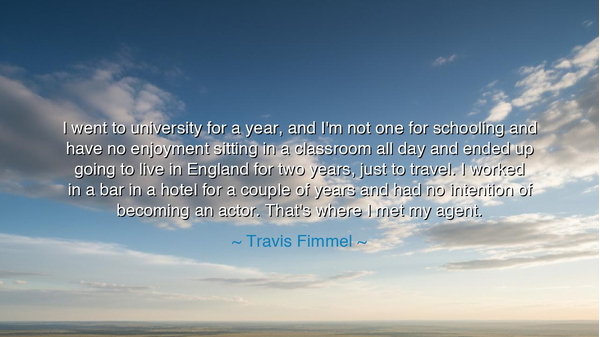
I went to university for a year, and I'm not one for schooling
I went to university for a year, and I'm not one for schooling and have no enjoyment sitting in a classroom all day and ended up going to live in England for two years, just to travel. I worked in a bar in a hotel for a couple of years and had no intention of becoming an actor. That's where I met my agent.






Hear, O seeker of truth, the words of Travis Fimmel, who once confessed: “I went to university for a year, and I’m not one for schooling and have no enjoyment sitting in a classroom all day and ended up going to live in England for two years, just to travel. I worked in a bar in a hotel for a couple of years and had no intention of becoming an actor. That’s where I met my agent.” These words, though spoken in the tongue of everyday life, carry the fire of destiny and the lesson of the unexpected path.
The first part of the tale speaks of university, of schooling, of the restless spirit that could not be contained within the walls of a classroom. Not all souls are shaped for study in books; some are shaped for study in life. There are those who find their wisdom not through parchment and lectures, but through wandering, trial, and the dust of roads. To admit, “I had no enjoyment,” is not shameful, but honest. For every person must discover the soil in which his seed of purpose may grow.
Thus he cast himself upon the winds of fate and journeyed to England, not with grand designs, but simply to travel. Here lies the ancient truth: often the roads we take without purpose lead us to the very purpose we were born for. To walk foreign streets, to labor among strangers, to taste the unknown—these are schools as great as any university. The tavern and the marketplace, the inn and the city street—they are classrooms for the soul, teaching lessons no book can hold.
In the bar, pouring drinks for travelers and guests, he thought himself far from greatness. Yet the hands that lifted mugs and wiped counters were unknowingly preparing him for destiny. For it was there that he met his agent, the messenger of fate, the one who would open the gate to a path he had never sought: the path of the actor. Thus the lesson is revealed: life often places opportunity not in the temples of learning, but in the ordinary halls where labor and chance converge.
Consider, O listener, the tale of Cincinnatus, the Roman farmer. He had no thought of empire nor of leading armies, yet when his people called, he left the plow and took command, saving Rome. When his duty was done, he returned again to his field. Like Travis, he had not sought greatness, but greatness sought him. This is the way of destiny: it finds those who are prepared in humility, in toil, and in openness to the unknown.
The meaning of Fimmel’s words is thus: that the paths of men are not always straight, nor planned by the designs of their youth. What begins as rejection of schooling, what seems a waste of time in a bar, may become the crucible in which fate shapes its chosen vessel. The lesson is not that one must despise education, nor exalt wandering, but that one must remain open to the currents of life, for they may carry us where we least expect, and yet exactly where we are meant to be.
Therefore, O child of tomorrow, take this teaching into your heart: Do not despair if your path is crooked, or if your labor seems humble and without glory. Do not believe that greatness is only found through the gates of the classroom or in the plans carefully drawn. Instead, live fully, with courage to seek new lands, humility to work with your hands, and openness to the strangers who cross your path. For the agent of destiny may come when you least expect it, and the life you were not seeking may be the one awaiting you.
So walk with faith. Travel, learn, work, fall, rise again, and be ready. For even in the most ordinary hour, fate may whisper your true name, and the world will be changed because you heeded its call.






AAdministratorAdministrator
Welcome, honored guests. Please leave a comment, we will respond soon